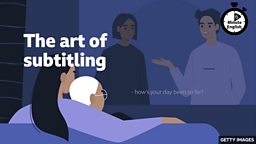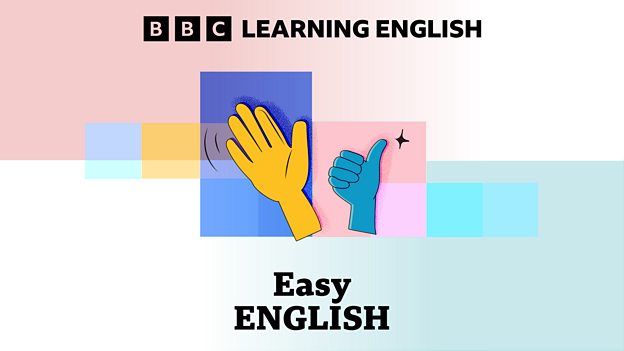6 Minute English
Intermediate level
Can we live without plastic?
Episode 231214 / 14 Dec 2023

____________________________________________________________________________
Learn more about the environment
____________________________________________________________________________
Introduction
Is it time to start living without plastic? Beth and Neil discuss this and teach you some useful vocabulary.
This week's question
Which items did plastic first replace?
a) snooker balls?
b) shopping bags? or,
c) hairbrushes?
Listen to the programme to hear the answer.
Vocabulary
single-use plastic
plastic products which are designed to be used just once before being thrown away
microbeads
tiny plastic particles found in personal care products like toothpastes and body scrubs
synthetic
non-natural; made by combining artificial man-made chemicals
biodegrade
decay naturally, in a way that is not harmful
few and far between
very rare; not happening very often
unsightly
ugly; unattractive; unpleasant to look at
TRANSCRIPT
Note: This is not a word-for-word transcript.
Neil
Hello. This is 6 Minute English from BBC Learning English. I’m Neil.
Beth
And I’m Beth. “Plastic is fantastic!” This phrase was used a lot in the 1950s when mass- produced plastic items started to become part of our everyday lives. The following decades saw a revolution as plastic became the most commonly used material in modern life, found in everything from cars to furniture to packaging. Take a quick look around and you’ll soon see how many everyday items contain plastic.
Neil
But now our love of plastic is being questioned, mostly thanks to climate change and pollution caused by single-use plastics – plastic products which are designed to be used just once before being thrown away. 11 million tonnes of plastic waste are dumped into our oceans every year. It’s believed that single-use plastics make up 40% of all plastic pollution globally.
Beth
What’s more, it’s not just land and water being polluted – tiny plastic pieces known as microbeads have even been found inside the human body, and can be passed from mother to child through breast milk. And because plastic comes from fossil fuels, the process of making it creates problems at every stage, from burning coal, to transportation, to recycling. In this programme, we’ll be asking: is it time to live without plastic? And, as usual, we’ll be learning some useful new vocabulary as well.
Neil
But first I have a question for you, Beth. One reason why plastic became so popular is that it’s a very flexible material. It can be formed into different shapes, making it useful for keeping food fresh, or holding liquid. Originally, plastic was invented to replace the decreasing supply of natural materials like metal, wood and glass. So which items did plastic first replace? Was it:
a) snooker balls?
b) shopping bags? or,
c) hairbrushes?
Beth
Hmm, I guess the first thing to be made of plastic was a hairbrush.
Neil
OK, Beth, I’ll reveal the answer later in the programme. Dr Sherri Mason is Professor of Chemistry at Penn State University in the US, and a specialist in plastic pollution. Her award-winning 2017 research into microplastics in rivers led to the US Congress banning microbeads. Here, she explains the problem of plastics to BBC World Service programme, The Real Story:
Dr Sherri Mason
Plastic is synthetic and, as a consequence of that, nature doesn't really know what to do with it. Like, a paper bag that's sitting on the side of the road - it's unsightly but within weeks there are organisms in the soil that can use that paper bag as a food source, right… they have evolved to basically chew up that paper bag and turn it back into soil, turn it back into carbon and nitrogen and oxygen. But with regard to plastic because it is a synthetic material you don't have that evolution. There are some organisms that can use it as a food source, but they're few and far between, especially when you're talking about water systems, aquatic systems and the temperatures that exist, and so they can't really use it as a food source so plastic doesn't biodegrade…
Beth
Plastic is a synthetic material, meaning that it’s made by combining man-made chemicals, instead of existing naturally. Natural materials like paper decay and harmlessly turn back into soil – they biodegrade. But plastic is not like this. It doesn’t decay and get broken down by microbes and bacteria.
Neil
In fact, some plastic-eating microbes and bacteria do exist, but these are few and far between, they’re rare, and don’t happen very often. It’s the fact that plastic doesn’t decay which is responsible for the waste we see in the environment, waste which is often unsightly, meaning ugly and unpleasant to look at.
Beth
Fortunately, help is at hand. The plastic-eating microbes Neil mentioned, especially one called Rhodococcus ruber, have been tested by scientists and seem capable of breaking down plastic into its basic components. What’s also needed is an emphasis on reducing plastic production, especially packaging and other single-use products, rather than simply recycling. Action like this should help plastic achieve its original purpose – to help preserve, not pollute, our natural resources. And speaking of the origins of plastic, isn’t it time to reveal the answer to your question, Neil?
Neil
Right. I asked you which object made of natural materials was the first to be replaced by plastic. You said it was a hairbrush which was… the wrong answer I'm afraid, Beth. In fact the first plastic-moulding machine was used in 1872 to produce snooker balls. OK let's recap the vocabulary we've learned from this programme starting with single-use plastics - plastic products which are designed to be used just once before being thrown away.
Beth
Microbeads are tiny plastic particles found in products like toothpastes and body scrubs which can enter and pollute rivers, seas, and the human body.
Neil
The adjective synthetic describes a non-natural material made by combining chemicals.
Beth
To biodegrade means to decay naturally, in a way that is not harmful to the environment.
Neil
The phrase few and far between means very rare or not happening very often.
Beth
And finally, if something is described as unsightly, it’s ugly and unpleasant to look at. Once again our six minutes are up. Join us next time for more trending topics and useful vocabulary here at 6 Minute English. Goodbye for now!
Neil
Goodbye!
Latest 6 Minute English

Sexism: Female farmers fighting back
Episode 231228 / 28 Dec 2023
How can female farmers beat rural sexism?



Invasive species: Why don't we eat them?
Episode 231207 / 07 Dec 2023
Could we eat invasive species?

What and where is Little Italy?
Episode 231130 / 30 Nov 2023
Mozzarella, ricotta, cannolis and focaccia... Where are we? Little Italy of course!

Social media and teenage health
Episode 231123 / 23 Nov 2023
What are the health risks of social media for teenagers?








Sounds that make you want to scream
Episode 230928 / 28 Sep 2023
Are there any sounds you find upsetting?




The stories behind our names
Episode 230831 / 31 Aug 2023
What do our names reveal about our culture and family history?


Are you unhappy at work?
Episode 230817 / 17 Aug 2023
Does work leave you feeling bored and exhausted?







Is it wrong to eat plants?
Episode 230629 / 29 Jun 2023
Should we treat plants with the same consideration we treat animals with?



The art of subtitling
Episode 230608 / 08 Jun 2023
Hear how subtitles can help bring TV and movies to life

Ecotourism: good or bad?
Episode 230601 / 01 Jun 2023
We discuss the growing popularity of ecotourism.

Can climate change cause more disease?
Episode 230525 / 25 May 2023
With warming temperatures, mosquitos are now spreading to new areas, including Europe.



Ice and the origins of life on Earth
Episode 230504 / 04 May 2023
We talk about an essential element for life to thrive.

Women in politics
Episode 230427 / 12 Apr 2023
We discuss some of the reasons why women make up only 26% of the world's politicians.

What's the point of museums?
Episode 230420 / 20 Apr 2023
We discuss the role of museums in the 21st century and the items taken from different countries.

How culture affects sadness
Episode 230413 / 11 Apr 2023
What ways do you think culture can influence sadness?

Would you eat a Kalette?
Episode 230406 / 06 Apr 2023
Hear about a new kind of vegetable making an entrance in British kitchens

Do you get jealous easily?
Episode 230330 / 06 Mar 2023
Let's talk about the ugly green-eyed monster


Food and mood
Episode 230316 / 16 Mar 2023
We look at the link between what you eat and how you feel.

How to talk to a climate denier
Episode 230309 / 09 Mar 2023
The dos and don'ts of trying to discuss science with someone who doesn't believe in it

Losing your mother tongue
Episode 230302 / 02 Mar 2023
Hear the story of a woman who replaced her native Czech for English.

The health benefits of apples
Episode 230223 / 23 Feb 2023
Could 'an apple a day keep the doctor away'?


Doomscrolling: Why do we do it?
Episode 230209 / 27 Jan 2023
What is doomscrolling and why are we attracted to bad news? Listen to find out!

Exercise for the lazy
Episode 230202 / 22 Jan 2023
What's the least amount of exercise you should do to stay healthy?

Can AI have a mind of its own?
Episode 230126 / 26 Jan 2023
Hear about the software engineer who became 'friends' with his computer

Climate change: Are there too many people?
Episode 230119 / 13 Jan 2023
Does the size of your carbon footprint depend on where in the world you were born? Listen to find out!

The hidden life of buffets
Episode 230112 / 12 Jan 2023
Neil and Sam discuss buffet meals and the history behind them.

Songwriting
Episode 230105 / 05 Jan 2023
Writing a memorable song isn't easy. So is there an art to good songwriting?







